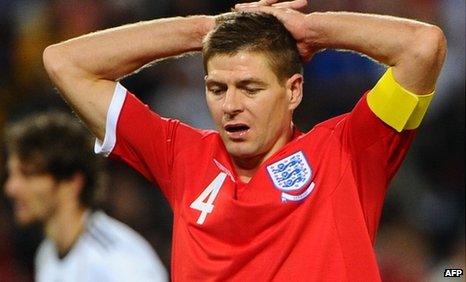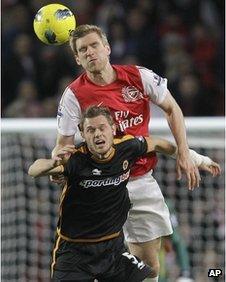Do Germany's players have an advantage over England?
- Published

Was tiredness to blame for England's loss to Germany at the 2010 World Cup?
"Sometimes, less is more," is Philipp Lahm's, external favourite saying.
The Bayern Munich and Germany captain seems to have a point when it comes to the Bundesliga. Unlike other major European leagues (Serie A in Italy, La Liga in Spain, England's Premier League), Germany's top flight makes do with only 18 teams.
Add the lack of a league cup, no cup replays, and the most generous winter break of all (five weeks) to the mix, and the national team's remarkably consistent record in big competitions over the decades seems less of a mystery.
If England are the most tired nation at tournaments, as their manager Fabio Capello suggests, then the Germans are surely the freshest.
But maybe it is not quite as simple as that. For a start, the argument would be a lot more convincing had German clubs had more success in Europe. As it is, they have not won a single trophy in the last decade.
The statistics on games played are also less clear cut. An extended run in the Champions League, such as the one enjoyed by Bayern in the 2009-10 season, can add another half a season to the workload.
BBC research into the actual number of games played by the two groups of players, external in the wake of Germany's 4-1 World Cup quarter-final win, external over England in Bloemfontein showed that Joachim Loew's men had actually amassed more matches (577) collectively that season than their opponents (555).
It is also often overlooked that in the furious, highly intense Premier League, the schedule actually slows down considerably for most teams in the spring.
Clubs not involved in the FA Cup or in Europe give their players plenty of mini holiday breaks or jet off to mid-season training camps in Spain. De-facto "downtime" in both countries will thus differ less than the Bundesliga's extended winter hiatus would suggest.
But even if the extent of the competitive advantage remains unclear, there is little doubt that everyone concerned welcomes the break in Germany.
Players get a chance to rest tired bones and minds. Clubs can calmly assess the strength of the squad, make managerial changes - SC Freiburg fired their coach Marcus Sorg last week, for example - or indeed use the time to stage lucrative friendlies in exotic locales.
League leaders Bayern's first fixture of the new year will take them to Delhi on 10 January for a game against India.
Even supporters prefer a change to their routine. The Christmas and new year period is a time when genuine winter sports such as skiing, ice hockey and ski-jumping take precedence, and the only football comes courtesy of pay TV transmissions of the Premier League.
Germans never cease to be puzzled by the British insistence on playing "between the years".
Relatively cold winters, especially in the south and east of the country, make stadium visits unappealing. What's more, the fact that most of the DFB Cup rounds are scheduled in midweek almost makes a break a necessity - otherwise the season would finish before the start of May.
In fact, in the past the Bundesliga was at liberty to continue well into June in years without Uefa or Fifa tournaments. The 1990-91 season saw a whopping 11-week winter break and the championship did not conclude until 15 June.
With the globalised calendar, that is no longer possible - to widespread regret.
"It's ludicrous that we're not playing between mid-May and August. May and June are the best times for football," complained Eintracht Frankfurt chief executive officer Heribert Bruchhagen.
When a shorter winter break was introduced in December 2009, German national team doctor Tim Meyer wondered about the effects on the players.
"There is less time to recover in the winter but the players might profit from a less congested fixture list later in the season," he said. "Maybe those two effects cancel each other out."
In a study by Germany's Saarbrucken University that compared injuries in 2008-09 (seven-week break) to that of 2009-10 (four weeks), no statistically relevant effects on player injuries were found.
Nor is there any reliable comparative data for the fitness of Bundesliga players relative to the Premier League, only anecdotal evidence - Munich-based Owen Hargreaves was said to have the best fitness levels of all England players in the 2006 World Cup, for example.
"Experts discuss whether England will ever win a competition," he told the BBC. "These games take a lot out of you but I'm happy to find out [how it will affect me]."

Mertesacker has enjoyed playing for Arsenal over the Christmas period
The 27-year-old added that training was less intensive than in the Bundesliga as a result.
"[Arsenal boss] Arsene Wenger is also careful to give his players time off between matches and it's good when you can miss the odd game in the Carling Cup, for example."
It will be interesting to see whether the stagnant TV rights market in Germany - the 36 Bundesliga 1 and 2 clubs receive £345m per season, compared with the £1.06bn distributed among the 20 Premier League members - will eventually lead to an extended league and an even shorter break.
Bigger clubs would certainly benefit, through additional matchday revenue if nothing else. The idea is yet to gather significant support, however.
If it is, in reality, impossible to quantify the specific benefit of the Bundesliga break in relation to the summer's Euro 2012 finals there are other factors that will surely not hurt the chances of Joachim Loew's team.
The manager's preference for selecting young players is testament to the importance of the physical side of the modern game, especially in view of an attacking German style that demands plenty of movement, with and without possession.
Capello is powerless to change the hurly-burly nature of English football but must at least play the hand he is dealt smartly.
In other words, if he is right that his players arrive at tournaments physically tired, that disadvantage should perhaps not be exacerbated by tactics - or lack thereof - that see England spend long periods chasing after the opposition.
Not that German players are immune from that failing. As Bastian Schweinsteiger noted after the 1-0 World Cup semi-final defeat against Spain, external, fitness is always relative.
"We spent so much time trying to win the ball back from the Spaniards that we were too tired do anything when we had it," the Bayern midfielder noted ruefully.
- Published5 August 2011